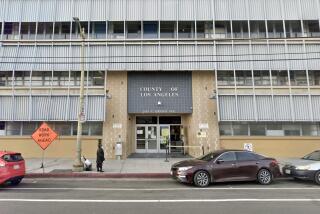You’ve Got Mail, and ...
In an age when many search for sex on the Internet, Los Angeles County health officials on Wednesday unveiled a controversial tool to fight the spread of HIV and other diseases: a website that helps send anonymous e-mail warning people that they might be infected.
Through the website, inSPOTLA.org, users can send a free, unsigned electronic postcard with a standard message or a personal note, thus avoiding an awkward conversation that many people would rather not have. The idea is to help people be more forthcoming with sexual partners so those at risk of sexually transmitted diseases get tested and practice safer sex.
The website, which anyone can use but is primarily aimed at people who seek casual sex online, is part of a broader national campaign. San Francisco launched a website in October 2004 that covered other infections, such as gonorrhea and chlamydia, which has generated about 20,000 e-mails. Only this month did it include HIV. Seattle, Philadelphia and Indiana are planning to launch inSPOT sites next year.
“It will help more people get tested early,” said Dr. Jonathan Fielding, public health director for the Los Angeles County Department of Health Services, which has invested more than $14,000 in the effort so far and plans to spend $8,000 annually on its operation. “We can get people into treatment and get them to modify their behavior.”
But some say the e-cards are an insensitive way to inform people of unpleasant or even alarming news. “There’s something about an anonymous e-mail that is a chicken way to do it,” said Jeffrey Prang, a West Hollywood councilman.
Others worry that the online tool could be ripe for abuse by pranksters. The diagnoses of those who use the site do not have to be confirmed by health officials. However, Deb Levine, executive director of the nonprofit agency that created the sites in Los Angeles County and San Francisco, Internet Sexuality Information Services, said far less than 1% of e-mails have been reported as pranks.
Steve Gibson, director of a San Francisco-based gay men’s health clinic, said the online notification has many benefits, especially for the partners of people who cannot bring themselves to break the news in person or by telephone.
Regardless of whether the partners choose to get tested, studies show that once people are aware that they are infected with HIV, they are likely to dramatically reduce their risky behavior, for example, by using condoms.
Gibson said, however, that the online notification is less than ideal and recommends that people do it face to face. If possible, he added, it’s best to do it in the presence of a counselor.
“Many people are really upset and devastated to get this news,” Gibson said.
The site, which went online in Los Angeles County on Wednesday, comes as AIDS-prevention efforts appear to have lost effectiveness, especially among gay and bisexual men.
Last month, the U.S. Centers for Disease Control and Prevention reported that the rate of new diagnoses among gay and bisexual men, stable for the last few years, rose 8% last year. A separate report issued by the agency this fall also showed a 29% rise in syphilis over the last four years among gay and bisexual men. In Los Angeles County, Fielding said, about a quarter of the 60,000 people living with HIV don’t know they are infected.
The rising number of sexually transmitted disease infections has been linked, in part, to increasing use of the Internet in the pursuit of casual sex. At websites such as Manhunt.net and in the “casual encounters” section of Craigslist.org, a free listings site, users find dates by describing themselves and posting photos.
Jeff Klausner, STD director in San Francisco, estimated that more than half of the men who are diagnosed with any sexually transmitted disease do not inform their current partners; even fewer inform former partners. More than ever, “we realize that to help control the continued spread of STDS, we need to get to the partners too,” he said.
The website inSPOTLA.org allows Internet users a comfortable and easy way to find and notify partners whose full names they may not know. Indeed, an e-mail address may be all the identifying information they have.
“We know the Internet has emerged as a highly efficient means to identify multiple ... partners. Whenever that occurs, we know there is an enormous risk of sexually transmitted infections,” said Dr. Peter Kerndt, who directs Los Angeles County’s sexually transmitted disease program.
At the website -- which is co-sponsored by the AIDS Healthcare Foundation -- users can choose from six electronic postcards to send to their partners. In addition to notifying them of possible exposure to HIV, they can also send messages on chlamydia, syphilis, gonorrhea, crabs and scabies.
Some of the electronic postcards are provocative or light in tone, while others are more straightforward. One shows a man’s muscled chest at a party and says, “It’s not what you brought to the party, it’s what you left with. I left with an STD. You might have, too.”
A more sober missive says, in part, “Going through my address book and you’re on the list,” and another e-card simply begins with “There’s something I need to tell you ... “
The site offers an option to write a personalized message, and leaves it up to the sender whether he or she wants to be identified.
In West Hollywood, some applauded the new approach.
“Anything is better than silence,” said Marc David Bronson, a 41-year-old department store manager who has had HIV since 1986 and is concerned about the rise in risky sex among gay men as fears about HIV decline.
Others said they wouldn’t like getting such sensitive information in an e-mail.
“To send a card saying, ‘Hi, I’ve been with you two months ago ... ‘ “ said Eyal Tal, a 32-year-old accountant from Los Angeles. “It sounds a little bit not fair.”
There’s also another problem that the site can’t solve: People often have no identifying information.
“It’s usually someone you met in a bar,” Tal said. “You don’t take their e-mail.”
More to Read
Sign up for Essential California
The most important California stories and recommendations in your inbox every morning.
You may occasionally receive promotional content from the Los Angeles Times.











